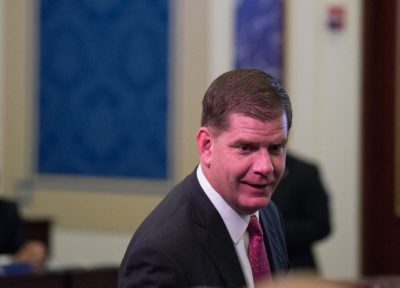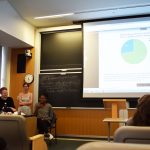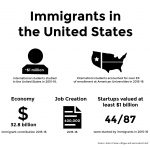
Boston Mayor Martin Walsh hosted an intimate roundtable with several local media outlets at Koy Boston, a restaurant located downtown, on Monday.
Throughout the discussion, Walsh talked about his role as the leader of Boston, touching upon prevalent issues he’s worked to combat such as homelessness and affordable housing, in conjunction with his plans for the future.
Walsh started off the conversation with a summary of his term as mayor, and said improvements to the city have been made under his leadership.
“We’ve done a lot of good,” Walsh said. “We’ve made a lot of progress.”
For instance, Walsh said, the economic state of Boston has witnessed a burst in job growth, with 60,000 new jobs being added since 2013.
Walsh discussed the prospect of Amazon potentially establishing headquarters in the area, and how that offers a wealth of opportunities for Boston residents. However, he did not delve into the plans further as Boston is currently in competition with other cities for the business’ new location.
“Having Amazon come to the City of Boston and bring 50,000 jobs invests four to $5 billion in investment,” Walsh said. “We’re going to do everything we can to put proposals together that they might like.”
Walsh also touched upon the public safety measurements enacted during his term. Violent crime and property crime has decreased, as well as the homicide rates. Additionally, arrests have decreased by 40 percent, Walsh said.
“Our homicide rate is roughly around average [at] 50 homicides per year, give or take some years,” Walsh said. “We haven’t gone more than 52 homicides [a year] since I’ve been mayor.”
Affordable housing arose as a point of discussion during the roundtable as well. Walsh said the City has consistently had five to seven billion dollars in development going on at any given time.
In October of 2014, Walsh launched a housing plan that prospected 53,000 units of new housing by 2030, he said. Approximately 22,000 units have either already been built or are currently under construction, Walsh said, with nearly 9,000 of those units classifying as low to moderate income housing.
Walsh emphasized the reason why rents are so high in the city is because of there being a high demand for housing, and not enough supply to meet it. Walsh said the City is working to address this imbalance.
“We’ve given a little leeway on the rents,” Walsh said. “We’ve balanced them by about four percent.”
Walsh said the housing being built cannot keep up with the all of the people coming in, with consideration to the approximately 30,000 new residents since he came into office.
“We have baby boomers wanting to move back into the city of Boston, and we have millennials that want to stay in the city of Boston after college,” Walsh said. “We need more supply, that’s the bottom line.”
Walsh said he believes real estate agents are only contributing to the problem, as they increase property prices for a higher commission.
Chronic veteran homelessness in the city has ended under Walsh’s term, he said. More than 800 homeless veterans have been housed since 2015, in addition to being offered veteran services. The City has also housed 300 other homeless people, Walsh said.
Walsh spoke extensively about how Boston has accepted immigrants into its community, including how the Boston Police Department is going to be involved with ensuring the local immigrant population feels comfortable and safe.
“We’re going to continue to fight for our immigrants,” Walsh said.
Although there is uncertainty with exactly how the federal government will deal with DACA, the City still has resources available for immigrants, including free clinics on how to pass the citizenship test, Walsh said.
“We continue to [have] an open-door policy to help people and try to make people comfortable,” Walsh said.
The mayor also mentioned the investments the City has made in underperformed schools. For instance, $1 billion has gone into school infrastructure, and pilot programs have been introduced to study how students fare in advanced work classes, Walsh said.
“We’ve made some investments in pulling all of our kids up, not just focusing on one area of education,” Walsh said. “I think BuildBPS [Boston Public Schools] will help us and help communities really think about how they want to see the future of their schools.”
Walsh added he wants to work on ways of gearing standardized tests so that students who are new to the country and speak English as a second language are not penalized.
“You have kids that come from Haiti, speaking Haitian Creole, and they’re taking a standardized test in tenth grade. They can’t do well in that,” Walsh said. “I think we have to start thinking about the standardized test [and] how do we gear it towards making sure you don’t penalize a kid just because they’re new here.”




